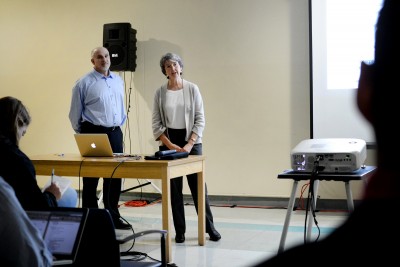
Student attendees and members of the Boston University Task Force on General Education expressed differing opinions during a gathering Thursday evening for a town-hall style meeting to discuss the currently developed General Education Program.
Approximately 15 students attended the meeting in the Warren Towers Multipurpose Room to voice their concerns toward the program. The program will provide a set of core knowledge for students across all BU colleges, Task Force co-chair Elizabeth Loizeaux said.
“We’re happy to talk to any student who wants to talk to us,” Loizeaux said after the meeting. “The Dean of Students office has been working really hard to get the word out, so we want to talk to more students.”
Through conversation with students, Loizeaux said, the Task Force gains a better understanding on what are the core values of BU students.
“This is a Task Force that is supposed to envision a framework for a university-wide General Education Program, which we define as the core knowledge, skills and habits of mind that should define a BU graduate,” Loizeaux said.
The Task Force members, appointed by Provost Jean Morrison in November 2014, were given the task to create a university-wide curriculum. They have consulted more than 1,000 BU community members throughout 37 meetings held last year, Loizeaux said.
The Task Force working paper currently contains a list of 12 core traits, including skills such as understanding diversity, critical thinking, ethical reasoning, scientific reasoning, quantitative reasoning, historical knowledge, research experience, collaborative mindsets and creative thinking, cited on the Task Force’s website.
Task Force co-chair Bruce Schulman said once put into place, the program will unify a set of foundation courses undergraduate students take and provide a universal core curriculum that would benefit the students in a long run.
“General Education requirements will make it much more possible for students to move from college to college, or to not even have to transfer if they want to take classes through another college,” Schulman said after the meeting.
The Task Force is also trying to put forth the idea of a “Cross-College Challenge,” a collaborative project between juniors and seniors in different colleges in which they would work in small teams to address “real world problems,” Schulman said.
“One of the things we’re trying to do is make it so that when you graduate, and people know you to be an alumni of BU, that will mean something in the world,” Schulman said. “People will be able to expect that you’ve had a certain set of experiences.”
Several student attendees, all of whom are members of the Student Curriculum Committee, expressed strong disagreement on Task Force’s general education proposal. The SCC is a newly formed group dedicated to addressing concerns of underrepresented groups at BU, according to a SCC flyer provided before the meeting began.
Kush Ganatra, a junior in the College of Arts and Sciences, said he could not see why the university would not combine the existing Core Curriculum with General Education Program.
“We are deeply upset because the working paper included no mention of the Core Curriculum, which could have satisfied all of [the proposed general education requirements] adeptly,” Ganatra said.
Aelish Benjamin-Brown, a sophomore in CAS, said program contrasts with what she thinks makes BU a unique university.
“We picked BU because of the different schools we have,” Benjamin-Brown said. “We have College of Communication and Questrom School of Business, [and] at the end of the day, you can’t have those schools doing the same thing when they’re completely different, and that’s what general education will do.”
Gregory Kerr, also a sophomore in CAS, said though the program would not impact him personally, it is his responsibility to make sure future students will not be affected as well.
“I don’t want to see a future student go through a program that, in my opinion, is bad because I didn’t do anything about it,” Gregory said.




















































































































